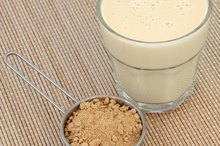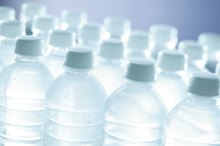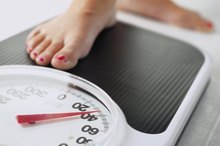The Side Effects of High-Protein Powder in Women
When you're working out hard, you may wonder if adding a high-protein powder to your daily regimen will help improve muscle tone. While protein is an important part of a woman's diet, eating too much may cause more harmful effects than positive ones. Talk to your doctor or dietitian to go over your diet and exercise plan to help you determine the right balance of nutrients.
Weight Gain
One potential side effect of taking a high-protein powder is weight gain. Depending on the brand of protein powder you're using, you can add an extra 150 to 200 calories to your diet with one serving. If you're taking in those calories in addition to your usual intake without making changes to your exercise routine, you may gain almost 2 pounds in a month. Knowing the number of calories you need, which for women ranges from 1,600 to 2,400 calories a day, can help you track your intake and stay in balance while taking protein supplements.
- One potential side effect of taking a high-protein powder is weight gain.
- Depending on the brand of protein powder you're using, you can add an extra 150 to 200 calories to your diet with one serving.
Risk of Dehydration
The Benefits and Drawbacks of Soy Protein Powder in Women
Learn More
Adding more protein to your diet with a supplement may increase your risk of dehydration. You need more water to metabolize protein and get rid of its byproducts, according to the American Council on Exercise. Researchers at the University of Connecticut who investigated the effects of protein intake on hydration suggest you increase your water intake when upping your protein. Adult women need at least 8 to 10 cups of water a day.
- Adding more protein to your diet with a supplement may increase your risk of dehydration.
- Researchers at the University of Connecticut who investigated the effects of protein intake on hydration suggest you increase your water intake when upping your protein.
Potential Effects on Bone Health
Eighty percent of the 10 million people in the United States with osteoporosis are women, according to the National Osteoporosis Foundation. Adding a protein powder to your diet may cause your body to excrete more calcium in your urine, which might increase your risk of developing osteoporosis, according to Today's Dietitian. To decrease your risk, make sure you meet your daily calcium requirement, which for women ranges from 1,000 to 1,300 milligrams a day.
Meeting Your Needs
What Are the Side Effects of MuscleTech Protein Drinks?
Learn More
How much protein you need a day depends on a number of factors, including your current weight and weight goals, your exercise routine and overall health. The Institute of Medicine says you should get 10 percent to 35 percent of your daily calories from protein. Pregnant and lactating women, as well as women who are more active, have higher protein needs than inactive women.
While it's acceptable to use protein powder to help you meet your daily protein needs, it's not necessary, according to a 2014 article published in Today's Dietitian, and you can more than adequately meet your protein needs by eating a variety of foods from all the food groups.
- How much protein you need a day depends on a number of factors, including your current weight and weight goals, your exercise routine and overall health.
- While it's acceptable to use protein powder to help you meet your daily protein needs, it's not necessary, according to a 2014 article published in Today's Dietitian, and you can more than adequately meet your protein needs by eating a variety of foods from all the food groups.
Related Articles
References
- ACE Fitness: Are There Health Risks Concerning Eating Too Much Protein?
- Today's Dietitian: Athletes and Protein Intake
- HealthAliciousNess.com: Nutrition Facts Comparison Tool: Beverages ABBOTT EAS Whey and Soy Protein Powder
- U.S. Department of Agriculture and U.S. Department of Health and Human Services: Dietary Guidelines for Americans, 2010
- FamilyDoctor.org: What It Takes to Lose Weight
- University of Connecticut: Too Much Protein Can Lead to Dehydration, Researchers Find
- Office of Dietary Supplements: Calcium
- Leidy, H. J., Clifton, P. M., Astrup, A., Wycherley, T. P., Westerterp-Plantenga, M. S., Luscombe-Marsh, N. D., ... & Mattes, R. D. (2015). The role of protein in weight loss and maintenance. The American Journal of Clinical Nutrition, 101(6), 1320S-1329S.
- Halton, T. L., & Hu, F. B. (2004). The effects of high protein diets on thermogenesis, satiety and weight loss: a critical review. Journal of the American College of Nutrition, 23(5), 373-385.
- Campbell, W. W., & Leidy, H. J. (2007). Dietary protein and resistance training effects on muscle and body composition in older persons. Journal of the American College of Nutrition, 26(6), 696S-703S.
- Rafii, M., Chapman, K., Elango, R., Campbell, W. W., Ball, R. O., Pencharz, P. B., & Courtney-Martin, G. (2015). Dietary Protein Requirement of Men> 65 Years Old Determined by the Indicator Amino Acid Oxidation Technique Is Higher than the Current Estimated Average Requirement, 2. The Journal of Nutrition, 146(4), 681-687.
- US Department of Health and Human Services. (2017). Dietary guidelines for Americans 2015-2020. Skyhorse Publishing Inc.
- World Health Organization, & United Nations University. (2007). Protein and amino acid requirements in human nutrition (Vol. 935). World Health Organization.
- Wolfe, R. R., Cifelli, A. M., Kostas, G., & Kim, I. Y. (2017). Optimizing Protein Intake in Adults: Interpretation and Application of the Recommended Dietary Allowance Compared with the Acceptable Macronutrient Distribution Range. Advances in Nutrition, 8(2), 266-275.
- Bauer, J., Biolo, G., Cederholm, T., Cesari, M., Cruz-Jentoft, A. J., Morley, J. E., ... & Visvanathan, R. (2013). Evidence-based recommendations for optimal dietary protein intake in older people: a position paper from the PROT-AGE Study Group. Journal of the American Medical Directors Association, 14(8), 542-559.
- Campbell, W. W., Trappe, T. A., Wolfe, R. R., & Evans, W. J. (2001). The recommended dietary allowance for protein may not be adequate for older people to maintain skeletal muscle. The Journals of Gerontology Series A: Biological Sciences and Medical Sciences, 56(6), M373-M380.
- Thomas, D. T., Erdman, K. A., & Burke, L. M. (2016). American College of Sports Medicine Joint Position Statement. Nutrition and Athletic Performance. Medicine and Science in Sports and Exercise, 48(3), 543-568.
- Vellas, B. J., Hunt, W. C., Romero, L. J., Koehler, K. M., Baumgartner, R. N., & Garry, P. J. (1997). Changes in nutritional status and patterns of morbidity among free-living elderly persons: a 10-year longitudinal study. Nutrition, 13(6), 515-519.
- Deutz, N. E., Bauer, J. M., Barazzoni, R., Biolo, G., Boirie, Y., Bosy-Westphal, A., ... & Singer, P. (2014). Protein intake and exercise for optimal muscle function with aging: recommendations from the ESPEN Expert Group. Clinical Nutrition, 33(6), 929-936.
- Antonio, J., Ellerbroek, A., Silver, T., Orris, S., Scheiner, M., Gonzalez, A., & Peacock, C. A. (2015). A high protein diet (3.4 g/kg/d) combined with a heavy resistance training program improves body composition in healthy trained men and womenâa follow-up investigation. Journal of the International Society of Sports Nutrition, 12(1), 39.
- Antonio, J., Peacock, C. A., Ellerbroek, A., Fromhoff, B., & Silver, T. (2014). The effects of consuming a high protein diet (4.4 g/kg/d) on body composition in resistance-trained individuals. Journal of the International Society of Sports Nutrition, 11(1), 19.
- Houston, D. K., Nicklas, B. J., Ding, J., Harris, T. B., Tylavsky, F. A., Newman, A. B., ... & Health ABC Study. (2008). Dietary protein intake is associated with lean mass change in older, community-dwelling adults: the Health, Aging, and Body Composition (Health ABC) Study. The American Journal of Clinical Nutrition, 87(1), 150-155.
- Kerstetter, J. E., Looker, A. C., & Insogna, K. L. (2000). Low dietary protein and low bone density. Calcified Tissue International, 66(4), 313-313.
- Scott, D., Blizzard, L., Fell, J., Giles, G., & Jones, G. (2010). Associations between dietary nutrient intake and muscle mass and strength in communityâdwelling older adults: the Tasmanian Older Adult Cohort study. Journal of the American Geriatrics Society, 58(11), 2129-2134.
- Pilgrim, A., Robinson, S., Sayer, A. A., & Roberts, H. (2015). An overview of appetite decline in older people. Nursing Older People, 27(5), 29.
- Keri Marshall, N. D. (2004). Therapeutic applications of whey protein. Alternative Medicine Review, 9(2), 136-156.
Writer Bio
Jill Corleone is a registered dietitian and health coach who has been writing and lecturing on diet and health for more than 15 years. Her work has been featured on the Huffington Post, Diabetes Self-Management and in the book "Noninvasive Mechanical Ventilation," edited by John R. Bach, M.D. Corleone holds a Bachelor of Science in nutrition.









